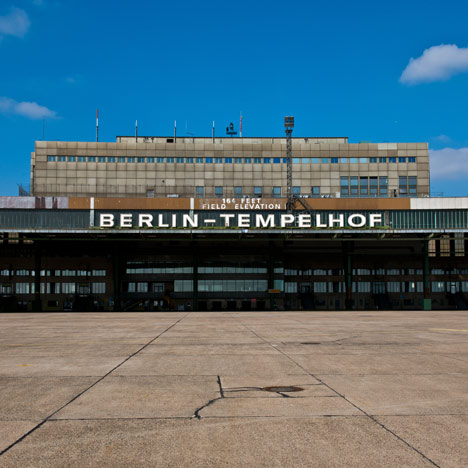Dezeen promotion: Dezeen are in Berlin this week for new design fair Qubique - read on for details of special events at the former Tempelhof airport until 29 October.
Qubique features a Dezeen Web Station designed by Neulant van Exel where you can relax and browse the internet. Dezeen are also co-hosting a party with Red, the association of Spanish design companies, in Berlin on Friday - read more details and get your invitation here.
Entry is free throughout to trade professionals and visitors can gain access on 28 and 29 October for €14.50 for a day ticket or €18.50 for a two-day pass – register here.
Here are some more highlights at Qubique, with cations from the organisers:
Gallery walk
Qubique will welcome its visitors in October 2011 with a special highlight, the Gallery Walk. Eight glass pavilions located in the entrance hall of the Berlin Tempelhof Airport, formally hosting travel agents, will be occupied by eight international design galleries that exhibit and sell selected pieces of furniture and objects of design. With gallery partners from the US, the Lebanon, Israel, Switzerland, Germany, France and Austria the Gallery Walk is a compact design world tour in itself.
Ventura Berlin
With their project Ventura Lambrate, which has been taking place during the Milan furniture fair and presents a premium selection of works by contemporary designers, Margriet Vollenberg and Margo Konings of Organisation in Design have made a name for themselves on the international scene. For Qubique they present Ventura Berlin, which will be directly integrated into the fair, featuring a curated area with different design projects and objects by young and established designers, galleries, collectives and institutions.
Among other exciting works, Ventura Berlin will be the first exhibition outside of The Netherlands to show The Empty Chair by Maarten Baas for Amnesty International.
Qubique Factory
In the Qubique Factory, visitors will be permitted to view the production of the legendary Thonet bent wood chair 214 on the 28th and the 29th of October in Hangar 7, Showroom 1, and they may even participate in the production of this furniture classic under professional supervision. With the Qubique Factory, the trade show creates a connection with the manufacturing process and shows visitors interested in design how furniture is produced: the backrest of the so-called classic Viennese cafe chair, the current model 214 by Thonet, will be produced with the help of a mobile steam vessel directly at Qubique.
Visitors are invited to bend solid wood dowels into shape themselves together with two professional wood benders. The wood is steamed in a pressure vessel and then shaped using bending tools and corresponding accessories. The bending of solid wood into three-dimensional shapes was revolutionary in its time, and it has maintained its fascination until today.
Qubique Black Box
Qubique and Hermann August Weizenegger, designer and professor of product design at the FH Potsdam, are introducing the concept of a prototype platform at the trade fair for the first time. The Qubique ›Black Box‹ will be placed at the center of the trade show. It will display approximately 20 prototypes from two generations that have been personally selected by Weizenegger. Only manufacturers will be admitted to the Box; the press and the broad public will not be permitted. Manufacturers may examine the prototypes professionally and then leave their business card discreetly in a small black box placed next to the respective display piece. After the trade show is finished, designers can look at the business cards that they have received and then contact interested manufacturers.
Global:Local - connecting knowledge
Supported by Asahikawa Furniture Cooperative and Deutscher Designer Club (ddc)
Qubique aims to create a platform for innovative design and good craftsmanship and also to promote the networking of furniture manufacturers and the design world. Within the framework of a special exhibition, Qubique will present the initiative global:local, which was created under the auspices of the Deutscher Designer Club (DDC) and the Japanese Asahikawa Furniture Cooperative. global:local will show the opportunities that can be created through the promotion of good design, local craftsmanship and exchange of experience between creative designers and manufacturers worldwide.
The current project of the global:local initiative is a bilateral collaboration between 28 German and Japanese participants, including designers, architects, graphic designers, photographers and furniture manufacturers from the Japanese region of Asahikawa. This region enjoys a long history and a large pool of expertise in the field of furniture manufacture, which has its own production culture and local identity. Central to this are not just artistic concepts or the pure functionality of design products, but rather the sustainable approach taken. Aspects such as social responsibility and eco-friendly manufacturing skills are combined with regional traditions and expertise as well as good design. In this way, products are produced in a way that is sensitive to the environment and social production culture and that contributes to local and international economic growth at the same time.
global:local is an idea and initiative from Wolf U. Wagner (furniture designer, international managing director of DDC) from Frankfurt and Minoru Nagahara (furniture designer, chairman) from Asahikawa. The initiative aims to show that advanced globalization also brings positive effects, making exceptional regional expertise in the sectors of craftsmanship, industry and design available to a global audience.
At Qubique 2011, products will be exhibited that have been produced within the framework of the initiative. Some of the designers as well as initiators of the project from Germany and Japan will be there in person.
Read more about Qubique in our earlier story.

